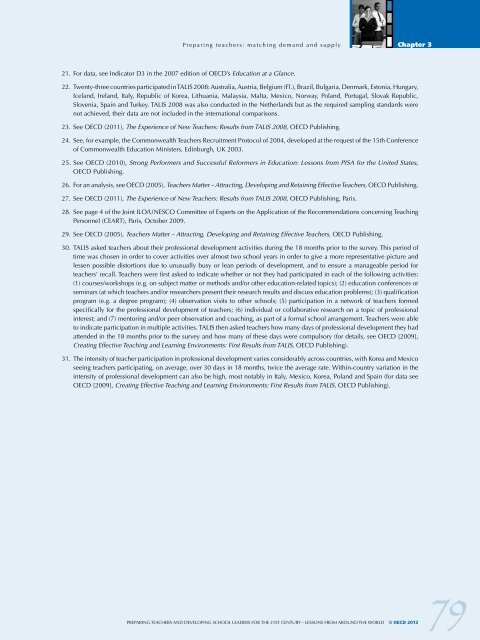Preparing Teachers and Developing School Leaders for the 21st Century
Preparing Teachers and Developing School Leaders for the 21st Century
Preparing Teachers and Developing School Leaders for the 21st Century
You also want an ePaper? Increase the reach of your titles
YUMPU automatically turns print PDFs into web optimized ePapers that Google loves.
<strong>Preparing</strong> teachers: matching dem<strong>and</strong> <strong>and</strong> supply<br />
21. For data, see Indicator D3 in <strong>the</strong> 2007 edition of OECD’s Education at a Glance.<br />
Chapter 3<br />
22. twenty-three countries participated in talis 2008: australia, austria, Belgium (fl.), Brazil, Bulgaria, denmark, estonia, hungary,<br />
icel<strong>and</strong>, irel<strong>and</strong>, italy, republic of Korea, lithuania, Malaysia, Malta, Mexico, norway, Pol<strong>and</strong>, Portugal, slovak republic,<br />
slovenia, spain <strong>and</strong> turkey. talis 2008 was also conducted in <strong>the</strong> ne<strong>the</strong>rl<strong>and</strong>s but as <strong>the</strong> required sampling st<strong>and</strong>ards were<br />
not achieved, <strong>the</strong>ir data are not included in <strong>the</strong> international comparisons.<br />
23. see oecd (2011), The Experience of New <strong>Teachers</strong>: Results from TALIS 2008, oecd Publishing.<br />
24. see, <strong>for</strong> example, <strong>the</strong> commonwealth teachers recruitment Protocol of 2004, developed at <strong>the</strong> request of <strong>the</strong> 15th conference<br />
of commonwealth education Ministers, edinburgh, uK 2003.<br />
25. see oecd (2010), Strong Per<strong>for</strong>mers <strong>and</strong> Successful Re<strong>for</strong>mers in Education: Lessons from PISA <strong>for</strong> <strong>the</strong> United States,<br />
oecd Publishing.<br />
26. <strong>for</strong> an analysis, see oecd (2005), <strong>Teachers</strong> Matter – Attracting, <strong>Developing</strong> <strong>and</strong> Retaining Effective <strong>Teachers</strong>, oecd Publishing.<br />
27. see oecd (2011), The Experience of New <strong>Teachers</strong>: Results from TALIS 2008, oecd Publishing, Paris.<br />
28. see page 4 of <strong>the</strong> Joint ilo/unesco committee of experts on <strong>the</strong> application of <strong>the</strong> recommendations concerning teaching<br />
Personnel (ceart), Paris, october 2009.<br />
29. see oecd (2005), <strong>Teachers</strong> Matter – Attracting, <strong>Developing</strong> <strong>and</strong> Retaining Effective <strong>Teachers</strong>, oecd Publishing.<br />
30. talis asked teachers about <strong>the</strong>ir professional development activities during <strong>the</strong> 18 months prior to <strong>the</strong> survey. this period of<br />
time was chosen in order to cover activities over almost two school years in order to give a more representative picture <strong>and</strong><br />
lessen possible distortions due to unusually busy or lean periods of development, <strong>and</strong> to ensure a manageable period <strong>for</strong><br />
teachers’ recall. <strong>Teachers</strong> were first asked to indicate whe<strong>the</strong>r or not <strong>the</strong>y had participated in each of <strong>the</strong> following activities:<br />
(1) courses/workshops (e.g. on subject matter or methods <strong>and</strong>/or o<strong>the</strong>r education-related topics); (2) education conferences or<br />
seminars (at which teachers <strong>and</strong>/or researchers present <strong>the</strong>ir research results <strong>and</strong> discuss education problems); (3) qualification<br />
program (e.g. a degree program); (4) observation visits to o<strong>the</strong>r schools; (5) participation in a network of teachers <strong>for</strong>med<br />
specifically <strong>for</strong> <strong>the</strong> professional development of teachers; (6) individual or collaborative research on a topic of professional<br />
interest; <strong>and</strong> (7) mentoring <strong>and</strong>/or peer observation <strong>and</strong> coaching, as part of a <strong>for</strong>mal school arrangement. teachers were able<br />
to indicate participation in multiple activities. talis <strong>the</strong>n asked teachers how many days of professional development <strong>the</strong>y had<br />
attended in <strong>the</strong> 18 months prior to <strong>the</strong> survey <strong>and</strong> how many of <strong>the</strong>se days were compulsory (<strong>for</strong> details, see oecd [2009],<br />
Creating Effective Teaching <strong>and</strong> Learning Environments: First Results from TALIS, oecd Publishing).<br />
31. <strong>the</strong> intensity of teacher participation in professional development varies considerably across countries, with Korea <strong>and</strong> Mexico<br />
seeing teachers participating, on average, over 30 days in 18 months, twice <strong>the</strong> average rate. Within-country variation in <strong>the</strong><br />
intensity of professional development can also be high, most notably in italy, Mexico, Korea, Pol<strong>and</strong> <strong>and</strong> spain (<strong>for</strong> data see<br />
oecd [2009], Creating Effective Teaching <strong>and</strong> Learning Environments: First Results from TALIS, oecd Publishing).<br />
PreParing teachers <strong>and</strong> develoPing school leaders <strong>for</strong> <strong>the</strong> <strong>21st</strong> century – lessons froM around <strong>the</strong> World © OECD 2012<br />
79


